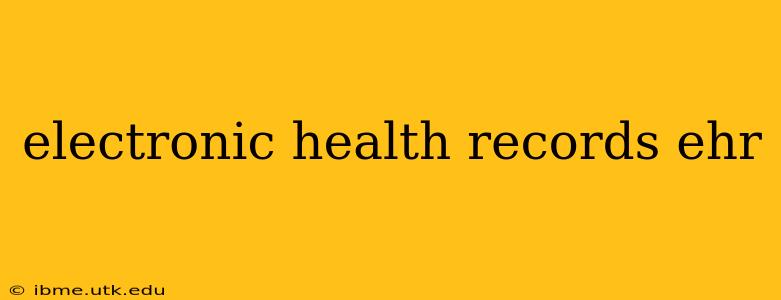Electronic health records (EHRs) have revolutionized healthcare, transforming how patient data is collected, stored, and accessed. This comprehensive guide explores the intricacies of EHRs, addressing key aspects and frequently asked questions. From understanding their core functionalities to examining their impact on patient care and the future of healthcare, we delve into the world of EHRs.
What is an Electronic Health Record (EHR)?
An electronic health record (EHR) is a digital version of a patient's chart. It contains all of a patient's medical history, including diagnoses, medications, allergies, immunization dates, and lab results. Unlike traditional paper charts, EHRs are readily accessible to authorized healthcare providers, facilitating improved communication and coordination of care. This centralized system offers significant advantages over paper-based systems, enhancing efficiency and patient safety.
What are the benefits of using EHRs?
The advantages of EHRs are numerous and far-reaching. They improve the efficiency and quality of healthcare in several ways:
- Improved Patient Care: EHRs provide a complete picture of a patient's health history, enabling more informed clinical decisions. This reduces medical errors and improves the overall quality of care.
- Enhanced Coordination of Care: Healthcare providers can easily access and share patient information, facilitating seamless transitions between different care settings. This is especially beneficial for patients with complex medical needs.
- Increased Efficiency: EHRs automate many administrative tasks, reducing paperwork and freeing up staff time for patient care. This streamlined workflow leads to significant cost savings.
- Better Patient Engagement: Patient portals associated with EHRs empower patients to access their medical records, schedule appointments, and communicate directly with their providers.
- Improved Public Health Surveillance: EHR data can be aggregated and analyzed to identify and track disease outbreaks, improving public health outcomes.
What are the drawbacks of using EHRs?
While EHRs offer numerous benefits, some challenges remain:
- High Initial Costs: Implementing and maintaining EHR systems can be expensive, particularly for smaller healthcare practices.
- Steep Learning Curve: Healthcare professionals require training to effectively use EHR systems, which can be time-consuming.
- Privacy and Security Concerns: Protecting patient data from unauthorized access and breaches is crucial. Robust security measures are essential.
- Interoperability Issues: Lack of standardization across different EHR systems can hinder data exchange between providers.
- Potential for Physician Burnout: The extensive documentation requirements associated with EHRs can contribute to physician burnout.
How do EHRs improve patient safety?
EHRs significantly contribute to patient safety through several mechanisms:
- Reduced Medication Errors: EHRs can alert clinicians to potential drug interactions or allergies, minimizing the risk of medication errors.
- Improved Diagnostic Accuracy: Access to complete patient history aids in more accurate diagnoses.
- Enhanced Communication: Seamless information sharing between healthcare providers reduces miscommunication and improves care coordination.
- Automated Reminders and Alerts: EHRs can remind clinicians about preventive care measures or follow-up appointments.
What is the difference between EMR and EHR?
While the terms EMR (Electronic Medical Record) and EHR (Electronic Health Record) are often used interchangeably, there's a subtle distinction. An EMR focuses primarily on the clinical data collected within a single healthcare organization, while an EHR encompasses a broader view, including data from multiple sources and settings across the patient's entire healthcare journey.
How secure are EHRs?
EHR security is paramount. Robust security measures, including encryption, access controls, and regular security audits, are implemented to protect sensitive patient data. Compliance with regulations like HIPAA (Health Insurance Portability and Accountability Act) in the US is essential for safeguarding patient privacy.
What is the future of EHRs?
The future of EHRs involves continued advancements in interoperability, artificial intelligence, and data analytics. AI-powered tools can assist with diagnosis, treatment planning, and risk prediction. Enhanced interoperability will facilitate seamless data sharing across healthcare systems, improving care coordination and population health management. The integration of wearable technology and telehealth platforms will further expand the capabilities of EHRs.
This comprehensive overview provides a solid understanding of electronic health records and their crucial role in modern healthcare. As technology continues to evolve, EHRs will undoubtedly play an even more significant role in improving patient care and the overall efficiency of the healthcare system.
